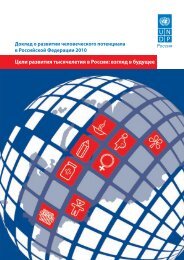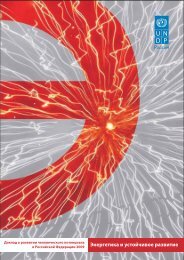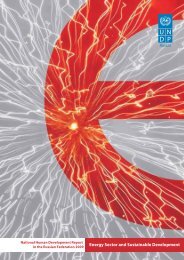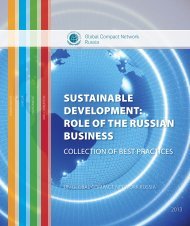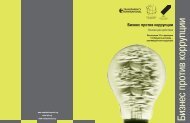educational process met the demands of potentialemployers and students 22 . Power engineering wasamong the fields studied. The findings are quitedisturbing. Almost a quarter of students nearingcompletion of their education said that they wouldlike to adjust their specialization but could not do so,because the field they were majoring in is toonarrowly defined and their schools provide no flexiblemechanisms for changing specialization betweenadmission and graduation. Some 80% of students saidthat all the courses in their study programme weremandatory.The research also found that students aregenerally expected to be passive recipients ofknowledge. According to the survey results, 95% ofstudents nearing completion said that lectures werethe primary mode of instruction, 20% said theynever participated in a discussion or projectworking in a small group, and a third had neverprepared their own presentations. In most cases theinstructor was the primary source of information,with few students trying to search for informationon their own. Only 20% of students surveyed hadparticipated in projects of their instructors, 33% ofthe students nearing completion had never doneprojects of their own, 55% had not implementedprojects as part of a group, 55% had not preparedany presentation on a completed project, 85% hadnever been involved in projects for real customers,60% had never read books on their subject in aforeign language.Results of the education process are verifiedmainly by oral and written examinations and throughoral defence of course papers. Tests in class are usedvery seldom, while 60% of surveyed students hadnever had to write an essay.Links between universities and potentialemployers are very limited. Some 63% of studentsnearing completion knew either very little or nothingat all about working conditions in <strong>Russia</strong>n companiesfor graduates with their specialization (though 90%had been through some kind of work experience), andonly 32% had been given any information about whatto expect in their future jobs by their universities. Only37% had met with representatives of their potentialemployers, while 15% said that they had never beenintroduced to any technical, economic, or corporatenews of relevance to their profession. Finally, only35.9% of graduates with engineering degrees(including those with degrees in power engineering)find work in their field after graduation 23 .Based on the above, we can justifiablystate that:• Engineering universities and engineeringspecializations have to a large extent lost theirprestige in comparison with other types of highereducation. They seem willing to accept lowqualitystudents in order to fully use their intakequotas;• Narrowly defined specializations andimpossibility of fine-tuning individual trajectorieslead to a situation where a significant part of thetechnologies taught at university are obsolete incomparison with what graduates will have todeal with once they enter the job market.Students themselves are often frustrated by theimpossibility of tailoring the education, whichthey receive, to their individual preferences.• The passive role assigned to students in theeducation process, lack of hands-on experienceof working on projects alone or in groups orworking for real customers, lack of demand forinitiative, ambition and creativity, and lack ofawareness of the international technologicalframework tends to make graduates incapable ofinnovation, and suited only for roles astechnicians rather than engineers.To conclude, we will try to point out the mainrespects, in which <strong>Russia</strong>n technical higher education(including power engineering) has deteriorated, andpropose some steps that need to be taken in order torectify the situation.22An integrated assessment of education standards for students approaching graduation and of employment by aerospace companiesof graduates from specialized higher education schools. The research was carried out by United Aircraft Manufacturing Corporation aspart of work to design a system for supporting education of students and employment of graduates in the aerospace industry. See also:Maria Dobryakova, Isak Froumin. Higher engineering education in <strong>Russia</strong>: incentives for real change // International Journal ofEngineering Education. 2010, spring (forthcoming).23V. Gimpelson, R. Kapelushnikov, T. Karabchuk, Z. Ryzhikova, T. Bilyak. Choosing a profession; what did they learn and where were theyuseful? M., GU-VHSE, 2009, page 18.72 National Human Development <strong>Report</strong> in the <strong>Russia</strong>n Federation 2009
1. The number of graduates with engineeringdegrees far exceeds real demand in the economy. Thesituation is exacerbated by the fact that these largenumbers are achieved by significantly loweringadmission standards. There need to be far stricteradmission thresholds, and state funding of tuitionshould be on a per student basis.2. Universities are no longer making a cleardistinction between creative engineers and simpletechnicians. Both spent the same amount of timestudying and are often taught using the exact sameprogrammes. The existing engineering professions, inwhich universities offer training (including powerengineering professions), are often defined toonarrowly. We believe that universities must shift assoon as possible to two-stage training, where the firststage offers very broad bachelor degrees (for thosewho plan to continue their education majoring in anarrower field) and applied bachelor degrees fortechnicians, and where the second stage offersmaster’s degrees for creative engineers specializing inspecific fields.3. Engineering universities do not allowstudents to choose between courses. This reducesstudents’ interest in the process of acquiringknowledge and their motivation to seek a job in theirchosen field. The introduction of credits and modulesbased on ECTS, and transition to third-generationstate standards will offer more scope forindividualizing education, though it is difficult topredict how universities will make use of these newopportunities.4. Education at most engineering universitiesis not organized in a way that makes students workalone and in groups, participating in their instructor’sprojects and in projects for real customers.Modernization of the education process along theselines is a crucial part of reform of the engineeringeducation system, including power engineering.5. A broad professional horizon is anessential part of the education of a future engineer.But at present the absolute majority of engineeringstudents are only acquainted with <strong>Russia</strong>nachievements in their field, and the focus is ontheoretical knowledge, which does not always helpstudents to develop the practical skills they will needin the present market. The situation is exacerbated bythe fact that teachers themselves are oftentheoreticians, far removed from the practicalchallenges of the industry about which they teachand therefore barely able to navigate through theknowledge and competencies relevant to themodern economy. Until students know about thelatest trends in their chosen field, not only in <strong>Russia</strong>but in the rest of the world, and until they start doingreal-life projects during their studies, no sector of theeconomy will be supplied with personnel who canmeet the challenges of innovative work.6. To date interaction between universitiesand employers has failed to make the educationprocess more relevant to the challenges of thecontemporary economy and to ensure universityemployercooperation in preparing students for futurejobs. Engineering universities must realise that theyare a key element for implementation of stateeconomic policy. Effective training of new specialistswill only be possible if universities create appropriateinformation systems as well as formal and informalinterfaces, through which their graduates can movemore easily into the job market.73
- Page 1 and 2:
National Human Development Reportin
- Page 3 and 4:
National Human Development Reportin
- Page 5 and 6:
ACKNOWLEDGEMENTSThe authors express
- Page 7 and 8:
Dear Reader,You have before you the
- Page 9 and 10:
PREFACEThis is the 13 th National H
- Page 11 and 12:
country’s fuel & energy regions r
- Page 13 and 14:
environmental degradation and enhan
- Page 15 and 16:
Chapter 1The Energy Sector,the Econ
- Page 17 and 18:
By 2008 Russia had increased its sh
- Page 19 and 20:
the share of energy in the national
- Page 21 and 22:
exported, increased. However, this
- Page 23 and 24: elimination of structural and terri
- Page 25 and 26: • Establishment of competitive me
- Page 27 and 28: number of developed countries, incl
- Page 29 and 30: Although the United Nations Climate
- Page 31 and 32: industrial region of the Urals - Sv
- Page 33 and 34: 2.2. Budget capacityand structure o
- Page 35 and 36: (the Federal State Statistics Servi
- Page 37 and 38: Immigration by young and highly ski
- Page 39 and 40: energy regions exacerbate the incom
- Page 41 and 42: Khanty-Mansi and Yamal-Nenets Auton
- Page 43 and 44: the Ministry for Regional Developme
- Page 45 and 46: various other long-term problems in
- Page 47 and 48: is also associated with the fuel an
- Page 49 and 50: Republic of Mordovia 8051 0.732 68.
- Page 51 and 52: Legislative control of impact audit
- Page 53 and 54: Chapter 3Personal Incomes, the Ener
- Page 55 and 56: than any other sources of income -
- Page 57 and 58: Are wages now the main instrument f
- Page 59 and 60: comparison of month-on-month develo
- Page 61 and 62: • The unemployed, people who aree
- Page 63 and 64: Employment in the energy sector acc
- Page 65 and 66: The share of household expenditures
- Page 67 and 68: subsidization practices in the regi
- Page 69 and 70: in power use between regions now de
- Page 71 and 72: Electricity prices for households h
- Page 73: • Steady decrease in the percenta
- Page 77 and 78: As well as requiring better fuelcom
- Page 79 and 80: Box 4.1. The village of Kolvain Uss
- Page 81 and 82: continue to use solid fuel for a lo
- Page 83 and 84: Box 4.3. Ambient air pollution andp
- Page 85 and 86: either by large power generating fa
- Page 87 and 88: Box 4.6. A city at riskNovocherkass
- Page 89 and 90: In order to assess impact of thesee
- Page 91 and 92: generation facilities through safer
- Page 93 and 94: achieved in developed countries. So
- Page 95 and 96: equires 2-6 times more capital inve
- Page 97 and 98: government) should set targets and
- Page 99 and 100: networks. In 2007 government budget
- Page 101 and 102: enhancement is also important. Ener
- Page 103 and 104: energy efficiency of the transport
- Page 105 and 106: Box 5.1. Programme of the Ministry
- Page 107 and 108: educational and informational suppo
- Page 109 and 110: mechanism for using national quota
- Page 111 and 112: Figure 6.2Share of electricity gene
- Page 113 and 114: One of the major benefits of renewa
- Page 115 and 116: odies; outdoor air; rocks and soil;
- Page 117 and 118: Design and construction of geotherm
- Page 119 and 120: Box 6.3. Prospects for nuclear powe
- Page 121 and 122: consists of out-dated equipment at
- Page 123 and 124: ConclusionThe world’s nuclear pow
- Page 125 and 126:
7.1. Impact of the fuel& energy sec
- Page 127 and 128:
Table 7.5Solid waste from productio
- Page 129 and 130:
Table 7.7Areas of disturbed and rec
- Page 131 and 132:
nature of the impact (atmospheric e
- Page 133 and 134:
Further, the economic cost ofenviro
- Page 135 and 136:
trends continued the damage would a
- Page 137 and 138:
What the government needs to do ino
- Page 139 and 140:
Figure 7.2.1Specific atmospheric em
- Page 141 and 142:
money value of industrial output) c
- Page 143 and 144:
Figure 7.2.4Trends in specific atmo
- Page 145 and 146:
Chapter 8The Energy Industry and Su
- Page 147 and 148:
eing equal) it only reflects that p
- Page 149 and 150:
(MDGs), issued by the UN in 2000. T
- Page 151 and 152:
8.4. The energy factorin integral i
- Page 153 and 154:
Canada, the USA and Great Britain h
- Page 155 and 156:
Box 8.2. Energy efficiencyindicator
- Page 157 and 158:
Box 8.4. Energy efficiency rating o
- Page 159 and 160:
41 Penza Region 116.0 -35.2 -4.542
- Page 161 and 162:
Appendix to Chapter 1Table 1.1. GDP
- Page 163 and 164:
Attachment to Chapter 4Table 4.1Rus
- Page 165 and 166:
Attachment to Chapter 4Volga Federa
- Page 167 and 168:
Attachment to Chapter 4Belovo Belov
- Page 169 and 170:
The previous National Human Develop



